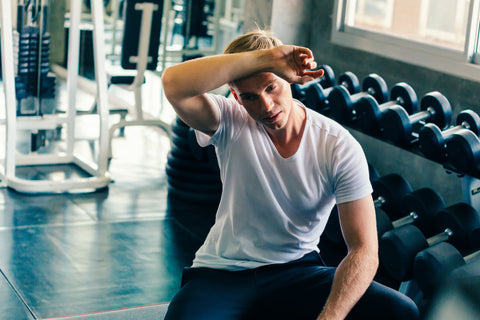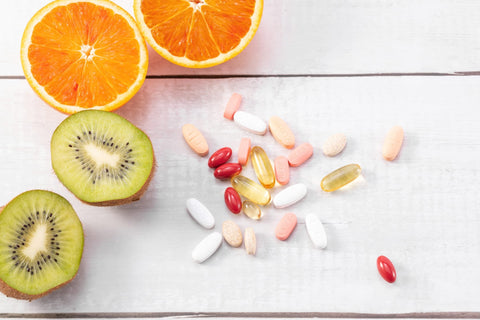Getting through a long workout can sometimes feel like a real test of your strength. You start strong, but as time passes, your energy level dips, your muscles tire, and keeping focus becomes a battle. Every minute longer in your workout can seem more demanding than the last, making it tempting to cut it short.
This experience can be incredibly frustrating, especially when you're committed to your fitness goals. The key question then becomes: How can you maintain that initial burst of energy throughout your entire workout?
Thankfully, staying energised during long workouts is possible with the right strategies and supplements.
In this post, we discuss tips to help you maximise your workouts.
Eat a Well Balanced Diet
Our body requires a mix of macronutrients, essential vitamins, and minerals to perform at its best. Without adequate nutrition, our energy levels can dip, recovery can slow, and overall performance may decline.
The key nutrients you should focus on include:
Carbohydrates
Carbs are your body's primary energy source during high-intensity workouts. They are stored in your muscles and liver as glycogen, readily converted into glucose and used for energy. A diet rich in complex carbohydrates such as whole grains, legumes, and vegetables ensures a steady supply of glucose during workouts and prevents the mid-workout energy dip.
For aerobic athletes who engage in prolonged, steady exercise, carbs should make up about 40-60% of their total caloric intake. A slightly lower carb intake of 30-35% is sufficient for anaerobic athletes who perform short, intense bursts of activity.
Proteins
While carbohydrates fuel workouts, proteins are necessary for recovery and muscle repair. Consuming adequate protein helps to rebuild the muscle fibres that break down during exercise. This helps prevent muscle fatigue and weakness during prolonged physical activity.
Athletes should aim for about 1.2 to 2.0 grams of protein per kilogram of body weight daily. Good sources include lean meats (chicken breast, lean beef), fish (salmon, tuna), eggs, and plant-based options such as tofu, legumes, and quinoa.
Fats
Healthy fats should comprise approximately 10-15% of your caloric intake. Fats are beneficial during prolonged workouts as they provide a concentrated energy source once carbohydrate stores are depleted. Including sources of unsaturated fats like avocados, nuts, seeds, and olive oil can help sustain energy during extended periods of physical activity.
Modify Meal Timings Around Your Workouts
Make sure to consume the right foods at the right time to maintain energy levels and enhance recovery.
Pre-Workout: Aim to eat a light meal or snack that combines carbohydrates with a bit of protein about two hours before exercising. This will give you the required energy without weighing you down. Examples include oatmeal with a handful of nuts, a smoothie made with fruits, and a scoop of protein powder. And of course we provide your perfect pre-workout supplements.
Post-Workout: Refuel shortly after your workout, ideally within one hour. This meal should include a good balance of proteins and carbohydrates to aid muscle repair and replenish energy stores. A turkey, an avocado wrap, or a bowl of rice with grilled salmon are great choices.
Improve Your Water Intake
Water regulates your body temperature, lubricates joints, and helps transport nutrients to give you energy.
Here are some tips to help you stay hydrated during intense workouts:
- Aim to drink at least 8-10 glasses of water a day.
- Increase your water intake on exercise days to compensate for the extra fluid loss through sweat.
- Drink at least 16 ounces of water about two hours before exercising. This pre-hydration helps prepare your body for sweat loss.
- Make sure to sip 7-10 ounces of water every 10-20 minutes of exercise. If you're exercising for over an hour, consider a sports drink that can replace electrolytes lost in sweat.
- Drink 20-24 ounces of water for every pound lost due to sweat immediately after your workout.
Adjust the Workouts According to Energy Levels and Body Signals
Listen to your body to avoid exertion and injuries as you continue towards your fitness goals.
Here's how you can tune into your body's signals and adjust your workouts accordingly:
Understand Your Energy Fluctuations
Energy levels can vary based on sleep quality, nutrition, stress levels, and recovery from previous workouts. Before beginning your exercise session, assess how you feel. If you're feeling low on energy, consider scaling down the intensity or shortening the duration of your workout.
Use Intuitive Training
Intuitive training involves adapting your workout plan based on your physical and mental state. For instance, if you're scheduled for a high-intensity interval training session but feel unusually tired, switch to a lighter activity such as yoga or a gentle walk. This approach helps prevent burnout and overtraining.
Include Rest and Recovery Days
Rest days allow your body to recover, rebuild, and get stronger. Intense workouts tear down muscle fibres. During the rest days, your body repairs these fibres and builds them back stronger. Without rest, you will experience overtraining symptoms such as prolonged fatigue, decreased performance, and increased risk of injury.
During the week, plan at least one to two rest days. On these days, avoid structured exercise, but consider light activities like stretching, walking, or gentle yoga to promote circulation and aid recovery without exerting stress on your body.
Besides rest days, aim to take at least 7-9 hours of quality sleep each night to support optimal muscle recovery and overall health. During sleep, your body produces growth hormones, which help tissue repair and muscle growth.
Lack of sleep hampers recovery and can affect your mood, cognitive function, and physical endurance.
Take Your Supplements
Supplements can enhance your energy and recovery during long workouts. While they are no substitute for a balanced diet, they can provide additional support where your diet may fall short.
Here are some supplements that can be particularly beneficial:
Creatine
Creatine is a molecule naturally found in muscles and foods like meat and fish. It helps muscles produce energy during heavy lifting or high-intensity exercise. Supplementing with creatine can increase muscle mass, strength, and exercise performance. It also may help with cognitive function and reduce fatigue and tiredness.
Beta-Alanine
This non-essential amino acid helps fight muscle fatigue by buffering the acids produced during strenuous exercise. Beta-alanine enhances performance by increasing exercise capacity and decreasing muscle fatigue. It is particularly effective during short—to medium-duration high-intensity workouts.
Branched-Chain Amino Acids (BCAAs)
These essential amino acids — leucine, isoleucine, and valine — are key in muscle protein synthesis and can help reduce muscle soreness and fatigue during exercise. They are metabolised directly in the muscle and not in the liver. BCAAs can preserve muscle glycogen stores, which fuel your muscles and minimise protein breakdown during workouts.
Caffeine
Caffeine is a powerful stimulant that can increase alertness and reduce the perception of effort during exercise, making workouts seem not as tough. This can help you train longer and at a higher intensity. Aside from improving endurance, caffeine can also enhance strength, power, and fat-burning.
Fish Oil
Rich in omega-3 fatty acids, fish oil supplements have powerful anti-inflammatory effects that can help reduce post-exercise soreness and improve joint health. Omega-3s are also known for their benefits to heart health, cognitive function, and overall inflammation.
Final Thoughts: Power Through Your Workouts with Improved Energy
Maintaining energy during long workouts is achievable with proper nutrition, hydration, and rest. By following the above tips, you can perform at your best, recover efficiently, and remain committed to your fitness goals without the risk of burnout or injury. Complement your efforts with supplements to enhance your workout effectiveness and recovery further.
Explore our carefully curated selection of premium supplements. Whether you're looking to boost your energy, increase recovery speed, or support overall health, we have something to help everyone achieve their fitness goals.



